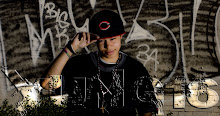Difference is the watchword
Right outside of Mills college, where the 580 meets Macarthur as it winds its way out of the lovely Laurel District and into East Oakland, there is a word painted on the walls beneath the overpass in gigantic white letters. The word: Difference. I think about those giant letters a lot these days.
I don’t consider myself a white girl—I was raised by an Indian mother and think of myself as fundamentally Desi. But all of my feelings of multi cultural ethnic identity get thrown out the window in deep east Oakland. Here, I don’t really know what else to call myself-- I am a white girl, no matter how much Indian blood might roil in my veins at that description. I am aware that I am the only light face for miles. It really is remarkable how segregated parts of Oakland are. (Other parts of Oakland are incredibly mixed, so it’s not just about race, but this part of East Oakland is primarily African American, and increasingly Latino, so it IS also about race).
My partner Sarah—with her gorgeous deep, dark skin bearing her Mexican heritage, only increases my feeling of being the thing that doesn’t fit. Still both of us are clearly outsiders and difference is the watchword.
I note this because as someone once (briefly) trained in the academy as an anthropologist, I was taught that ethnography was about being an observer. We talked theoretically about the way in the observers presence can change everyone’s behavior. But there was a fundamental drive to attempt objective observation. Part of this was made possible through deep immersion. A kind of making the self invisible through time. Okay, all very academic. But… A lot of the reporting we are doing is about asking questions and maybe in a perfect world we could be flies on the wall. Yet here, we can’t.
And in a perfect world places like the deep East wouldn’t exist as segregated, economically disinvested locales where violence is too often the norm.
In this, very real world, we are young, reasonably attractive women, and we change the reactions. We cause reactions. But this doesn’t mean that what we learn from these interactions isn’t telling, or true. But there is, especially at first, a Schrödinger's cat effect happening when we try to engage people. Reporting is not a one-way street. And just because Deep East Oakland is not a place where you live, or work, or even visit, its creation is not apart from us. It is much more a part of us. It didn’t just spring up from a vasty nothingness.
Neighborhoods like this one were made by history. A great part of the disinvestment of East Oakland occurred when the Macarthur Freeway, our great 580, was built. It effectively destroyed the commercial strip that is now Macarthur Blvd. There are still stores here, but in the Deep East, these are few and far between. Then came the crack epidemic, and government’s top down response to that manifestation of desperation and poverty—the war on drugs, which in many ways was a political policy that criminalized an entire neighborhood and its residents. These are things I try to not forget, communities are made, by outside forces as well as interior ones. We helped create this world. So I am not just an outsider visiting a foreign space. I am visiting a place that I helped to create by the very fact of being an American.
For me there is also this question: Should I not be going into a primarily African American neighborhood to try to document and tell stories? Do I have the right? This is big. I have to wonder this. Again and again.
It’s a question every journalist asks at some point, when you are engaged in the act of telling someone else’s story. But as I noted before, while these are other peoples stories, they are by dint of a common humanity, our stories too. The may be spatially isolated here, but they are so for a reason, and we can’t peel ourselves away from that.
I have come to believe as long as one doesn’t gloss over difference, as long as one is honest and aware of the underlying issues of race at play, it is not a wrong act to work here. For one, we get to know people personally. The creation of relationships, the engagement in conversation is the only way to truly reach across the fault-lines. And spending time with people who live here allows us to begin to understand first hand the issues people live with.
There was one time we went with our friend Tay Peezy to MacDonalds. He drove. Sarah and I got into the backseat and Peezy reminded us to put on our seat belts, “you’re driving with us now, that means you driving while black, so you better buckle up…” It was a joke. But it wasn’t. So we put on our seat belts.


No comments:
Post a Comment